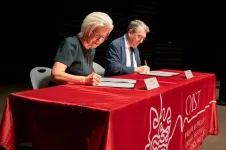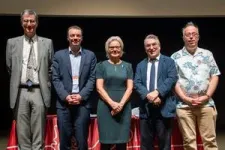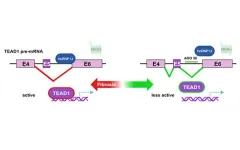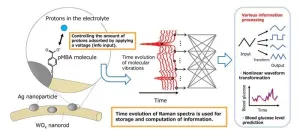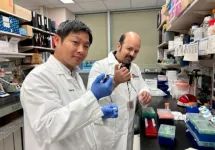(Press-News.org) The Okinawa Institute of Science and Technology (OIST) and France’s National Centre for Scientific Research (CNRS) have signed a letter of intent to work towards establishing an international research lab and agreeing on comprehensive academic collaboration.
The signing ceremony took place during the opening session of the OIST-CNRS Joint Symposium on West Pacific Marine Biology on April 23. Dr. Karin Markides, President and CEO, and Professor Vincent Laudet were among the speakers from OIST, and they were joined by representatives from CNRS, namely Dr. André Le Bivic, Director, CNRS Biology, Dr. Jacques Maleval, Director of the Tokyo Office, and Mr. Edouard Besserve, Deputy Director for Asia.
Having previously combined forces on two symposiums (one in 2022), OIST and CNRS will structure and strengthen their existing collaboration by establishing an international research lab to promote cooperation and inter-laboratory collaboration.
The researchers hope to accelerate biodiversity research in the Western Pacific region by conducting synergistic studies at various scales across fields in marine biology as they relate to the genomics, evolution, development, biochemistry, function, and ecology of a wide range of species, much of which is still unknown.
Upon signing the agreement, OIST President Markides noted that the agreement with CNRS is aligned with OIST's strategy to grow its connections with academia around the world. “We are excited to collaborate with CNRS’s incredible scientists to advance our shared goals because we know that international scientific collaboration is a key to solving some of society’s biggest challenges.”
Dr. Le Bivic, Director of CNRS Biology, who is visiting OIST from France, “This is the first step towards greater collaboration. This partnership will bring more opportunities for exchange to countries in the Western Pacific region, and marine biology will be a major force in that," he said, emphasizing the value of the partnership.
Photos from the signing ceremony are available here.
END
International network in Asia and Europe to uncover the mysteries of marine life
OIST and France's CNRS will partner on an international research lab promoting understanding of the largest and richest marine area on Earth
2024-04-26
ELSE PRESS RELEASES FROM THIS DATE:
Anthropologist documents how women and shepherds historically reduced wildfire risk in Central Italy
2024-04-26
In the last several decades, large forest fires have increasingly threatened communities across the Mediterranean. Climate change is expected to make these fires larger, hotter, and more dangerous in the future. But fire management lessons from the past could help to improve the resilience of local landscapes.
The latest research paper from environmental anthropologist and University of California, Santa Cruz Professor Andrew Mathews explores these issues in the Monte Pisano region of Central Italy. In particular, Mathews found that peasant women, who historically collected ...
Living at higher altitudes in India linked to increased risk of childhood stunting
2024-04-26
Living at higher altitudes in India is linked to an increased risk of stunted growth, with children living in homes 2000 metres or more above sea level 40% more at risk than those living 1000 metres below, finds research published in the open access journal BMJ Nutrition Prevention & Health.
Children living in rural areas seem to be the most vulnerable, prompting the researchers to advocate prioritising nutritional programmes in hilly and mountainous regions of the country.
Despite ...
Scientists discover a new signaling pathway and design a novel drug for liver fibrosis
2024-04-26
A healthy liver filters all the blood in your body, breaks down toxins and digests fats. It produces collagen to repair damaged cells when the liver is injured. However, a liver can produce too much collagen when an excess accumulation of fat causes chronic inflammation, a condition called metabolic dysfunction-associated steatohepatitis (MASH). In an advanced state, MASH can lead to cirrhosis, liver cancer and liver-related death.
The cells that produce collagen in livers are called hepatic stellate cells (HSC). In a new paper published in Cell ...
High-precision blood glucose level prediction achieved by few-molecule reservoir computing
2024-04-26
1. A collaborative research team from NIMS and Tokyo University of Science has successfully developed a cutting-edge artificial intelligence (AI) device that executes brain-like information processing through few-molecule reservoir computing. This innovation utilizes the molecular vibrations of a select number of organic molecules. By applying this device for the blood glucose level prediction in patients with diabetes, it has significantly outperformed existing AI devices in terms of prediction accuracy.
2. With the expansion of machine learning applications in various industries, there's an escalating demand for AI devices that are not only highly ...
The importance of communicating to the public during a pandemic, and the personal risk it can lead to
2024-04-26
**ECCMID has now changed its name to ESCMID Global, please credit ESCMID Global Congress (formerly ECCMID, Barcelona, Spain, 27-30 April) in all future stories**
In global crises like the COVID-19 pandemic, it is vital that scientists step forward to engage with the public and help deliver medical and scientific advice in a friendly, digestible and open format. While the traditional way for scientists to do this is by responding to media requests, alternatives, including collaborating with illustrators and local communities, will be discussed in a new ...
Improving health communication to save lives during epidemics
2024-04-26
During epidemics of Ebola, COVID-19, Zika and other public health emergencies, effective communication of public health messages is crucial to control the spread of disease, maintain public trust, and encourage compliance with health measures. In a new evidence review to be given at this year’s ESCMID Global Congress (formerly ECCMID) in Barcelona, Spain (27-30 April), Dr Benjamin Djoudalbaye from the Africa Centres for Disease Control and Prevention (AFRICA CDC) in Ethiopia, will discuss the challenges and lessons learnt from public health communication strategies during multiple epidemics across ...
Antimicrobial-resistant hospital infections remain at least 12% above pre-pandemic levels, major US study finds
2024-04-26
Hospital-related infections resistant to carbapenems, considered the antibiotics of last resort for treating severe infections, remain at least 35% higher than before the pandemic.
Findings also reveal that during the pandemic, hospitals experiencing surges due to high volumes of severely ill COVID-19 patients had the greatest increases in hospital-acquired antimicrobial-resistant infections, as did larger hospitals with increased bed capacity.
**ECCMID has now changed its name to ESCMID Global, please credit ...
German study finds antibiotic use in patients hospitalised with COVID-19 appears to have no beneficial effect on clinical outcomes
2024-04-26
Findings underscore need for rational antibiotic use especially during viral pandemics like COVID-19.
*ECCMID has now changed its name to ESCMID Global, please credit ESCMID Global Congress (formerly ECCMID, Barcelona, Spain, 27-30 April) in all future stories**
Antibiotic treatment of adults hospitalised with moderate COVID-19 is associated with clinical deterioration, despite the drugs being given to over 40% of patients, according to new research being presented at this year’s ESCMID Global Congress (formerly ECCMID) in Barcelona, Spain (27-30 April)
The findings underscore the need to discourage indiscriminate prescribing ...
Targeting specific protein regions offers a new treatment approach in medulloblastoma
2024-04-25
Targeting specific protein regions offers a new treatment approach in medulloblastoma
Scientists at St. Jude Children’s Research Hospital discovered a new compound that selectively targets parts of a cancer-related protein, EP300/CBP, in Group 3 medulloblastoma.
(MEMPHIS, Tenn. – April 25, 2024) Medulloblastoma (the most common malignant childhood brain tumor) is separated into four molecular groups, with Group 3 bearing the worst prognosis. By studying EP300 and CBP, critical proteins in Group 3 medulloblastoma cells, scientists at St. Jude Children’s Research Hospital designed a way to enhance anti-tumor ...
$2.7 million grant to explore hypoxia’s impact on blood stem cells
2024-04-25
INDIANAPOLIS — Indiana University School of Medicine scientists are on a mission to understand why hematopoietic stem cells, responsible for producing all types of mature blood cells, exhibit better responses in a low-oxygen environment within the bone marrow, also known as hypoxia. Their discoveries and innovative approaches could influence treatment options like bone marrow transplantation for conditions such as bone marrow failure and rare blood diseases involving gene corrected stem cells.
A new four-year, ...
LAST 30 PRESS RELEASES:
Brainwaves of mothers and children synchronize when playing together – even in an acquired language
A holiday to better recovery
Cal Poly’s fifth Climate Solutions Now conference to take place Feb. 23-27
Mask-wearing during COVID-19 linked to reduced air pollution–triggered heart attack risk in Japan
Achieving cross-coupling reactions of fatty amide reduction radicals via iridium-photorelay catalysis and other strategies
Shorter may be sweeter: Study finds 15-second health ads can curb junk food cravings
Family relationships identified in Stone Age graves on Gotland
Effectiveness of exercise to ease osteoarthritis symptoms likely minimal and transient
Cost of copper must rise double to meet basic copper needs
A gel for wounds that won’t heal
Iron, carbon, and the art of toxic cleanup
Organic soil amendments work together to help sandy soils hold water longer, study finds
Hidden carbon in mangrove soils may play a larger role in climate regulation than previously thought
Weight-loss wonder pills prompt scrutiny of key ingredient
Nonprofit leader Diane Dodge to receive 2026 Penn Nursing Renfield Foundation Award for Global Women’s Health
Maternal smoking during pregnancy may be linked to higher blood pressure in children, NIH study finds
New Lund model aims to shorten the path to life-saving cell and gene therapies
Researchers create ultra-stretchable, liquid-repellent materials via laser ablation
Combining AI with OCT shows potential for detecting lipid-rich plaques in coronary arteries
SeaCast revolutionizes Mediterranean Sea forecasting with AI-powered speed and accuracy
JMIR Publications’ JMIR Bioinformatics and Biotechnology invites submissions on Bridging Data, AI, and Innovation to Transform Health
Honey bees navigate more precisely than previously thought
Air pollution may directly contribute to Alzheimer’s disease
Study finds early imaging after pediatric UTIs may do more harm than good
UC San Diego Health joins national research for maternal-fetal care
New biomarker predicts chemotherapy response in triple-negative breast cancer
Treatment algorithms featured in Brain Trauma Foundation’s update of guidelines for care of patients with penetrating traumatic brain injury
Over 40% of musicians experience tinnitus; hearing loss and hyperacusis also significantly elevated
Artificial intelligence predicts colorectal cancer risk in ulcerative colitis patients
Mayo Clinic installs first magnetic nanoparticle hyperthermia system for cancer research in the US
[Press-News.org] International network in Asia and Europe to uncover the mysteries of marine lifeOIST and France's CNRS will partner on an international research lab promoting understanding of the largest and richest marine area on Earth
